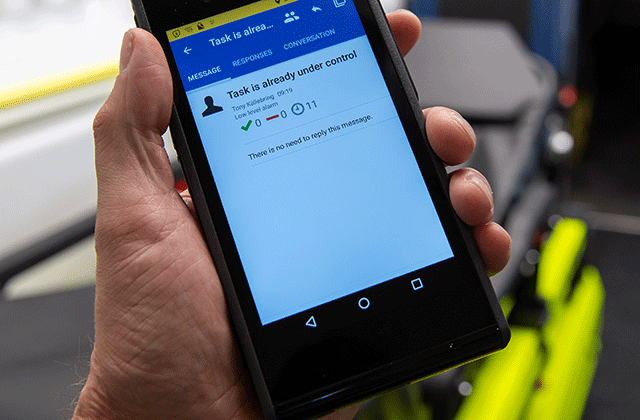Moving from TETRA or Tetrapol to 4G/5G mission-critical broadband is a huge undertaking and can take years to complete. Organizations want new and better ways of working for their users, but they also want to continue using investment they have already made. During the migration period, operations must also continue without interruptions. But why do migration projects fail – and how can you make sure your project succeeds? Here are four questions to ask potential service providers before you jump into broadband migration.
- Can the vendor support large migration projects or transition from one technology to another?
- What kind of after-sales support do they provide?
- Does the vendor provide support in your country?
- What is the total cost of ownership of the solution?
With narrowband solutions, everything was more straightforward. Public safety and other professional organizations would buy highly integrated, secure solutions that worked end-to-end from one vendor. Back then, choices were limited, but today, open standards are providing many more options. For example, most smartphones on the market can be used for professional tasks. However, all the components of the system must be proved to work to be secure and work seamlessly together from end-to-end. And if parts of the system change, you need to make sure that everything continues to work that way – which is a huge undertaking.
For example, organizations need to ensure high availability and reliability of service at anytime and anywhere. Ideally, different networks should be able to work seamlessly together – this means that a talk group could have users from several networks. People using digital or even analogue radio networks could talk to people using LTE/4G/5G networks. Professional users also want excellent voice quality, even in noisy places – and with any audio accessories they use. There should also be a simple way to manage all the smartphones and PMR radios, as well as the user profiles – even when users have an account in more than one network.

Adopting new technologies must be smooth and seamless, with minimal disruption. This needs planning, as well as new kinds of technical skills and resources. Many organizations may not have these skills and resources readily available – and this is why they fail.
Lack of skills and resources could also prevent you taking full advantage of the new broadband capabilities, which would be a wasted opportunity. The project would also take focus away from the organization’s core tasks and progress much more slowly. By using professional services, organizations could minimize risks, ensure full use of the new broadband features and minimize the project time.
However, just adopting any professional services does not guarantee success. How do you make sure your migration project doesn’t fail? There are a few questions you need to ask potential service providers before you jump into broadband migration:
4 questions to ask before adopting professional services
1. Can the vendor support large migration projects or transition from one technology to another?
Migration from TETRA or Tetrapol to 4G/5G broadband demands a more sophisticated approach than simple cellular subscriptions alone can provide. For example, organizations must consider subscriber management. If they don’t, they will end up with costly, often duplicate or multiple subscriber management systems. These are difficult or impossible to keep synchronised.
Both existing applications and new capabilities should work seamlessly and securely together. Otherwise, you might have trouble using them or you might not get full benefit from the new capabilities – just getting more bandwidth and doing the same thing would bring no added value for users.
Organizations need to achieve new levels of operational efficiency, safety and security. This requires new technical skills, such as managing a large amount of equipment (professional radios, smart devices, IoT sensors etc.). And if an organization has several locations, a professional service provider can even do an integration in one location and replicate it at another. This makes the project more efficient. Not all vendors can do this, so make sure your vendor can offer this support.

2. What kind of after-sales support does the vendor provide?
A 4G/5G migration project is similar to a massive construction project. Changes, adjustments, and even surprises are inevitable. This means the vendor must offer continuous support.
Regular software updates are not enough. Everything needs to work seamlessly and securely together from end to end. This must happen throughout the whole lifecycle of the solutions and with any future solutions.
For example, the average lifespan of a smartphone is around 2-3 years. This means that some of the “building blocks” will change over time. Somebody must be responsible for overall system integration. They need to make sure that everything continues to work seamlessly and securely together and that there will be no disruptions.
The vendor needs the skills and expertise to cover the whole MCX solution and its ecosystem. Most vendors can manage the most common use cases, but more complex use cases require more skills. Also, these projects often include a lot of different migrations happening at the same time. This requires proper planning and a phased approach. So make sure you will get all the support you need – not just during the migration itself, but throughout the lifecycles of the solutions.
Handpicked related content
How to plan for a hybrid approach when building broadband for public safety? Learn more and download this paper: "How to minimize risks when introducing mission-critical broadband".
3. Does the vendor provide support in your country?
Migration projects are not only about technology. Many governments require that critical infrastructure projects are managed by local authorities or people with their local nationality. They may also require that everything must be available in their local language. This often includes the application user interface, documentation, training material and on-site support.
So before getting started, make sure your chosen vendor can provide this kind of support, even on-site near your offices.

4. What is the total cost of ownership of the solution?
When planning migration to broadband, always look beyond the price of the smart or hybrid device and the mobile subscription. It may seem a cost-effective solution, but these things alone won’t bring what you need. You need everything to work seamlessly and securely together from end-to-end, throughout the lifecycles of solutions – no matter which technologies the members use.
You’ll also want to take full advantage of new broadband capabilities, because getting more bandwidth and doing the same thing would be a waste of money. So, to avoid missed opportunities or unpleasant surprises, check what the price tag actually includes and what it doesn’t. You’ll want to minimize costly mistakes and maximize the benefits of new capabilities when introducing mission-critical broadband.
This is why professional services are a great option. They can save your organization time, improve efficiency, and save money in the long run. You will also get access to experts and their skills, and their experience on similar projects.
Finally, if your organization has the resources and the skills to do some tasks itself (or by a local partner), you might be able to share the responsibilities with the vendor. This can save even more money, while still getting professional support for those areas you need support with.
Test yourself: Which services are best for you?
If you are planning to adopt mission-critical communications over broadband, or if you are already using an Airbus solution, take this 2-minute quiz – you’ll discover which professional services would best meet your needs!
You can answer anonymously. After the quiz, you can choose to receive the results by email. Your personal data will not be linked to your answers.
Did not find the service that’s right for you? Or need more information on professional services and how they can help you build a successful broadband future? Let the Airbus team help you.





